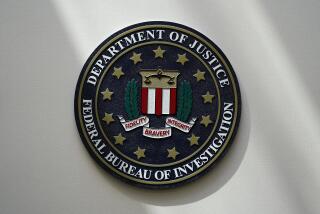Valerian Zorin, 84, Soviet Diplomat, Dies : Official Scoffed at U.S. Charges During Cuban Missile Crisis
- Share via
MOSCOW — Soviet diplomat Valerian A. Zorin, who scoffed at U.S. charges that his country had installed offensive missiles in Cuba, died on his 84th birthday, the Communist Party newspaper Pravda said.
Pravda said Zorin died Jan. 14, but gave no cause of death in its weekend report. Zorin had been removed from key positions in 1971 and held the post of ambassador-at-large at his death.
Pravda said Zorin was “highly valued” as a diplomat, but the obituary was signed by only three full Politburo members, while those for honored officials are customarily signed by a dozen or more Politburo members.
The full members signing the article were President Andrei A. Gromyko, Zorin’s former boss as foreign minister; Gromyko’s successor in that post, Eduard A. Shevardnadze, and Geidar A. Aliev.
Zorin was considered a top negotiator in the 1950s and ‘60s, but his prestige declined sharply in October, 1962, when then-Premier Nikita S. Khrushchev undercut his credibility at the United Nations.
During the Cuban missile debate in the U.N. Security Council, Zorin stubbornly clung to denials of American charges that the Soviets were installing rocket bases in Cuba. He called American photographic evidence of the bases a fake.
The debate may best be remembered by Adlai E. Stevenson’s challenge to Zorin that the Russian answer “yes or no . . . yes or no . . . do not wait for the interpretation . . . ,” to America’s charge of missile installations.
When Dorin refused to reply, Stevenson, then U.S. ambassador to the U.N., said, “I am prepared to wait for my answer until hell freezes over. . . .”
While this was going on, Khrushchev was conceding in an exchange of letters with then-President John F. Kennedy that Soviet missiles and bombers indeed were in Cuba.
When the Kremlin decided to negotiate an end to the missile standoff, it sent diplomat Vasily V. Kuznetsov from Moscow, bypassing Zorin. Kuznetsov, who is not a full member of the Politburo, was among other Kremlin officials who signed Zorin’s obituary.
Western diplomats in Moscow at that time suggested that the Kremlin had deliberately kept Zorin in the dark about the missiles.
That December, Zorin was relieved of his duties as the Soviet’s chief U.N. delegate and recalled to Moscow in a move seen as part of Khrushchev’s effort to appear conciliatory toward the West.
Zorin became ambassador to France from 1965-71 and then was appointed ambassador-at-large in charge of human rights issues.
Born into a teacher’s family, Zorin ran the Foreign Ministry’s Central European Department during World War II. From 1945 to 1947, he was ambassador to Czechoslovakia during the Kremlin’s postwar consolidation in Eastern Europe.
Zorin helped draw up the 1956 international fishing treaty and agreement on normalization of relations with Japan, a major postwar diplomatic move. He was appointed to the U.N. post in 1960.
More to Read
Sign up for Essential California
The most important California stories and recommendations in your inbox every morning.
You may occasionally receive promotional content from the Los Angeles Times.











